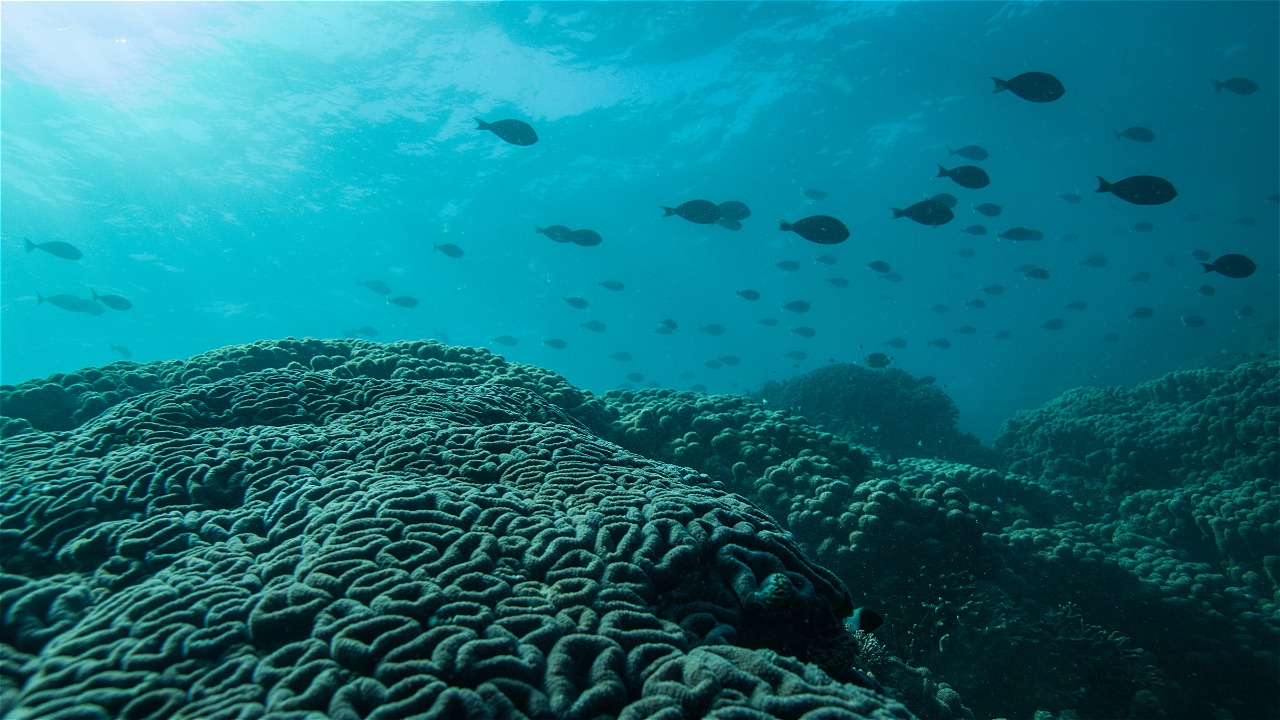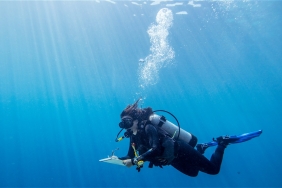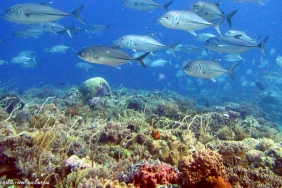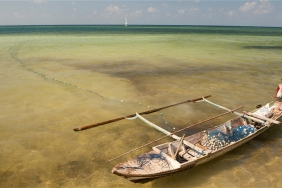“BLUE ECONOMY" CHALLENGE FOR INDONESIA
The concept of Blue Economy development in Indonesia was first presented by President Susilo Bambang Yudhoyono in his speech at the Leaders Valuing Nature event in the series of Rio +20 meeting in Brazil, June 2012. Blue economy has become a new development concept in Indonesia that promotes the use of natural resources for economic growth, social welfare, and environmental health.
In respond to the call, the Ministry of Maritime Affairs and Fisheries in collaboration with the Coral Triangle Global Initiative (CTGI) and WWF-Indonesia held Blue Economy seminar on Tuesday, December 4, 2012 at Golden Flower Hotel, Bandung. The seminar aims to introduce the concept of Blue Economy to the private sector in Indonesia, as well as to launch the third meeting of ""Regional Business Forum"" (3rd Coral Regional Business Forum/3rd CT RBF) that will be held on March 25 to 27, 2013 in Denpasar, Bali (www.ctirbf2013.com). This forum involves six countries in the world's coral triangle (Indonesia, Philippines, Malaysia, Papua New Guinea, Timor Leste, Solomon). The half-day seminar was attended by representatives of industrial sector, government, academia, and a number of students.
Present at the seminar a number of speakers, including Professor Dietrich Bengen from Bogor Agricultural University (IPB), who gave an introduction to the Blue Economy, also the Directorate General of Marine, Coastal and Small Islands Affairs (KP3K), which is represented by Agus Dermawan, Director of Coastal and Small Island Utilization. He presented the opportunities of Blue Economy application in the marine and fisheries sector.
""The Government strongly supports the industry to implement Blue Economy. On the coast and small islands, we have even made a Blue Economy pilot project through the Minapolitan program. We have run it in some areas,"" said Agus.
Daniel Rembeth, a senior adviser of Berita Satu media group was chairing the first session of the seminar. ""I am delighted to be invited to chair this seminar. I think it is important for the private sector to know more about the Blue Economy because they could create a new business while thinking about a more creative use of nature, ""said Daniel.
Challenges of Blue Economy development concept practically rests on the business world and industrial sectors in the middle of increasingly limited natural resources. Indonesian Chamber of Commerce and Industry (KADIN), represented by Rosdinal Salim, explained about a number of opportunities and challenges need to be addressed collectively by various parties, especially the regulator (government) in facilitating the business and industrial sectors that are committed to apply this concept onward. Rosdinal also conveyed the necessity of investment in infrastructure and the cohesive regulatory along with incentives and human resources that will continue creating new innovations for a more efficient and effective natural resources management.
""The industry is ready to support the implementation of Blue Economy concept. However, the government must support by building the infrastructure and providing supportive regulation, such as incentives for employers,"" said Rosdinal.
However, understanding the concept of Blue Economy itself is still contentious among the audience. DR. Lida Pet Soede, coordinator of WWF-Coral Triangle Global Initiative (WWF-CTGI) opened her presentation with a question,"" what is the dominant color can you conclude when looking at Planet Earth?"" Most of the participants in the seminar answered 'blue'. She then gave an illustration that when all the water mineral which gives the blue color on the planet is collected, it represents only a small part of the planet earth.
""We need 1.5 planets to provide food for humans on Earth. Since we only have one planet, where should we seek for the other half to fulfill the food need?"" said Lida. Her presentation revealed that there is only one planet, while human needs for food, water and energy continue to rise. Innovation is needed to address the challenge of saving the ecology while gaining the benefits of sustainable economic growth, according to the ideas of the Blue Economy concept.
The seminar also involved young thinkers gathered from essay writing competition on the Blue Economy topic from various universities in Indonesia, among others are Universitas Budi Luhur Jakarta, Universitas Indonesia, Institut Teknologi Bandung, Institut Pertanian Bogor, Universitas Gajah Mada Jogjakarta, Institut Teknologi Surabaya, and Universitas Udayana Denpasar. The winners of the competition were then involved in the seminar as youth think-tank (young thinkers) and given an opportunity to present their ideas on the Blue Economy.
From their interesting ideas, some ideas were raised to challenge the business world and government. Among others are the ideas of business scheme for marine area management that considers the ecological, economical and social welfare, the fish waste management from the industry of Gunung Kidul south coast community into Silae, coconut waste management from hotel and restaurant industry in Denpasar into cocofiber, etc. The innovative ideas from the youth think-tank will then be presented as a resolution at 3rd CT RBF meeting.
Translating ideas of Blue Economy out to the public is also a challenge that emerged from the seminar. Mass media is needed to be involved in mobilizing various sectors toward the concept of development. Although still addressed diversely by some participants, so far the Blue Economy is understood as a way of managing natural resources that promotes efficiency and effectiveness. Blue Economy uses several principles, namely creativity, innovation, use of local resources, and utilization of material to leave no waste in an effort of better natural resource management in the future.
For more information on the Blue Economy concept, please contact:
Dewi Satriani
Marine Communications Manager WWF-Indonesia
Graha Simatupang Tower 2 Unit C
Jalan Letjen TB. Simatupang, Jakarta 12540
Phone/Fax: +62-21-7829426-29/+62-21- 7829462
Mobile: +62-811910970
Email: dsatriani@wwf.or.id
Reference on the Blue Economy:
Link to the principles:
http://www.theblueeconomy.org/blue/Home.html
Link to 100 innovations:
http://www.zeri.org/ZERI/The_Blue_Economy.html
Link to the some examples of the innovation:
http://www.blueeconomy.eu/m/locations/view/Zero-Emissions-Hydrogen
http://paper.li/Blue_Economy/1325355558#





